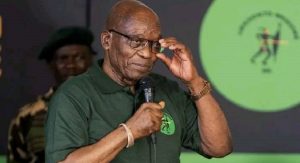Millions of eligible voters are likely to be disenfranchised should the local elections proceed on 27 October. This is due, in part, to the closing of the voters’ roll, without the final voter registration weekend having taken place.
The final voter registration weekend was scheduled for the end of July this year. The proclamation of the election date on 3 August signalled the end of the opportunity for voters to register or change their details on the voters’ roll.
The commission postponed the registration weekend from 17 and 18 July to the 31st and 1st of August because of the increasing number of infections and the impact that the pandemic had on the preparations for the general registration weekend.
Following the release of the Moseneke Report which recommended the postponement of elections and its adoption by the IEC on 23 July; the commission announced it would seek the urgent postponement of the local government elections and it postponed the voter registration weekend to a date to be determined as alert level four restrictions were still in place.
Just over a week later, however, in line with the fulfilment of her statutory obligations, Co-operative Governance Minister Nkosazana Dlamini Zuma proclaimed the election date of 27 October, effectively closing the voter’s roll and obliging the IEC to gazette its election timetable.
Minister Nkosazana Dlamini-Zuma briefing on elections:
Argument for postponement of elections
“There are 40 million eligible voters in South Africa. Only 25 million of them have been registered and even those who have registered, experience has taught us that many of them have moved from the municipalities that they were registered to new municipalities and would want to change that registration to vote where they now live. So, even that 25 million is an overstatement of the people that would be able to vote meaningfully in these elections and it would be a serious disenfranchisement of millions of people to force ahead simply to make the deadline,” lawyer for the Commission Wim Trengove arguing at the Constitutional Court on dire consequences of these events.
While Trengove insisted to the apex court that the IEC could not be blamed for the state of affairs, there are those who have a different view including Chairperson of the Elections Monitoring Network, Nkosikulele Nyembezi.
“What the IEC will be blamed for is a lack of aggressive voter registration process. As we have seen, there is a huge number of people still unregistered; some of them because of the coronavirus have moved from where they used to live and they cannot vote there. As we know in these elections, because they are local government elections, you must vote in the area where you live and they have not been afforded the opportunity to register and that will fall squarely on the IEC.”
Ongoing registration at local IEC offices
It can be argued, however, that voters have always been able to register on an ongoing basis at local IEC offices until the proclamation of the elections. Additionally, registered voters have, since 2018, been able to amend their registration details on the commission’s website.
The new voter registration system launched on 14 July also has enabled voters to now register online as opposed to having to do so in person at the IEC’s offices. Despite these opportunities, however, it seems many have been caught flat-footed and are either unregistered or have been unable to amend their details.
“I have not registered as yet, but I will do once I get the notification, but I have registered in previous years. So, I am sure I am registered to vote,” says one person.
Another person says, “I didn’t register because I was a little busy but I believe if they reopen I will register to vote.”
The IEC is still laying its hopes on the Constitutional Court to defer the elections to February next year. What it has made clear is that if the court does not accede to its request, there will be no opportunity for the reopening of the voters’ roll to allow all South Africans who wish to register to vote to do so.






